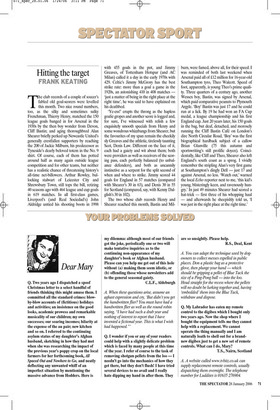Hitting the target
FRANK KEATING
The club records of a couple of soccer’s fabled old goal-scorers were levelled this month. Two nice round numbers, too, as the silky and sometimes sulky Frenchman, Thierry Henry, matched the 150 league goals banged in for Arsenal in the 1930s by the then boy wonder from Devon, Cliff Bastin; and aging thoroughbred Alan Shearer briefly perked up Newcastle United’s generally crestfallen supporters by reaching the 200 of Jackie Milburn, his predecessor as Tyneside’s dearly beloved totem in the No. 9 shirt. Of course, each of them has potted around half as many again outside league competition and for other teams, but neither has a realistic chance of threatening history’s all-time net-billowers. Arthur Rowley, bullocking stalwart of Leicester City and Shrewsbury Town, still tops the bill, retiring 40 seasons ago with 464 league and cup goals in 619 matches. In all first-class games, Liverpool’s (and Real Sociedad’s) John Aldridge untied his shooting boots in 1998 with 455 goals in the pot, and Jimmy Greaves, of Tottenham Hotspur (and AC Milan) called it a day in the early 1970s with 429. Celtic’s Jimmy McGrory has the best strike rate: more than a goal a game in the 1920s, an astonishing 410 in 408 matches — ‘just a matter of being in the right place at the right time’, he was said to have explained on his deathbed.
‘Ye-ess!’ erupts the throng as the hapless goalie gropes and another score is logged and, for sure, I’ve witnessed with relish a few exquisitely smooth specials from Henry and some wondrous whizzbangs from Shearer, but the favourites of my span remain the cheekily sly Greaves and the athletic, tirelessly taunting Scot, Denis Law. Different on the face of it, each had a gaiety and wit about them; both were providers as well as receivers of the scoring pass, each perfectly balanced (to unbalance defenders), and both as uncannily instinctive as a serpent for the split second of when and where to strike. Jimmy scored 44 goals for England in 57 matches (compared with Shearer’s 30 in 63), and Denis 30 in 55 for Scotland (compared, say, with Kenny Dalglish’s 30 in 102).
The two whose club records Henry and Shearer reached this month, Bastin and Mil burn, were famed, above all, for their speed. I was reminded of both last weekend when Arsenal paid all of £12 million for 16-year-old Southampton tyro, Theo Walcott. Speed of foot, apparently, is young Theo’s prime quality. Three quarters of a century ago, another Wessex boy, Bastin, was signed by Arsenal, which paid comparative peanuts to Plymouth Argyle. ‘Boy’ Bastin was just 17 and he could run at a lick. By 19 he had won an FA Cup medal, a league championship and his first England cap. Just 20 years later, his 150 goals in the bag, but deaf, detached, and morosely running the Cliff Bastin Café on London’s dire North Circular Road, ‘Boy’ was the first biographical hardback subject of a callow Brian Glanville (75 this autumn and sportswriting’s still prolific doyen). Coincidentally, like Cliff and Theo, Shearer also left England’s south coast as a sprog. I vividly remember the stripling Alan’s very first game at Southampton’s dingly Dell — just 17 and against Arsenal, no less. ‘Watch out,’ warned the local Echo reporter next to me, ‘this kid’s young, blisteringly keen, and ravenously hungry.’ In just 49 minutes Shearer had scored a hat-trick — first three of his whopping haul — and afterwards he sheepishly told us, ‘I was just in the right place at the right time.’






















































 Previous page
Previous page